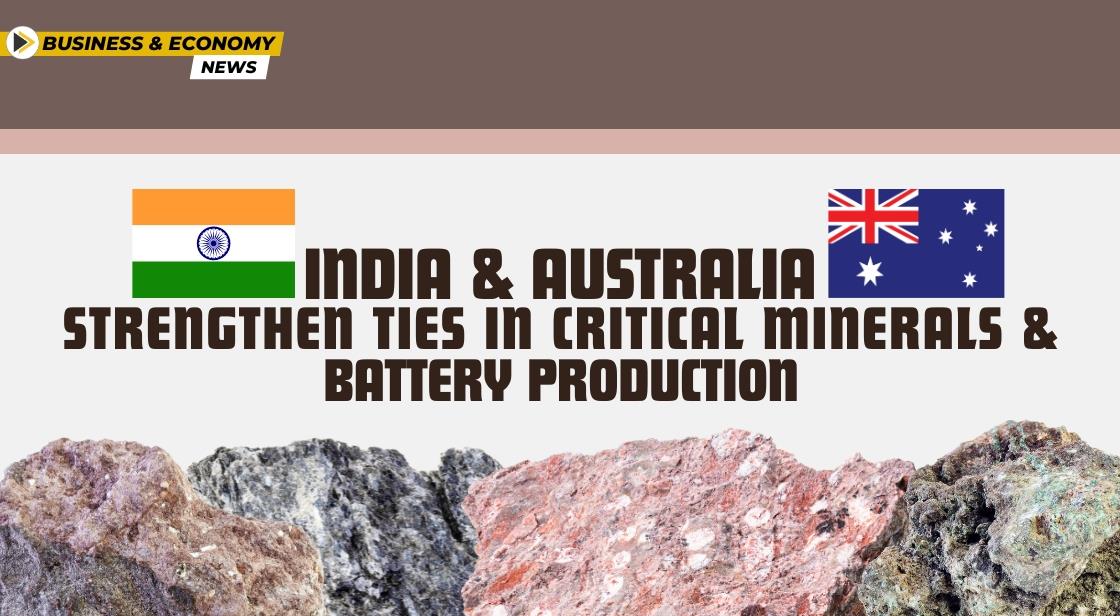India and Australia Strengthen Ties in Critical Minerals and Battery Production

News Synopsis
India and Australia are forging a strategic partnership to accelerate their transitions to clean energy, with a particular emphasis on electric vehicles (EVs). This collaboration focuses on three key areas: critical minerals, processing capabilities, and battery production.
India and Australia: A Match Made in Clean Energy
-
Boosting Cooperation: India's Commerce Secretary, Sunil Barthwal, announced plans to enhance cooperation with Australia in critical mineral exploration, processing, and battery production for EVs.
-
Free Trade Agreement Paves the Way: Both nations are currently expanding their existing interim free trade agreement into a comprehensive pact, further strengthening economic ties.
-
Focus on Integration: The collaboration aims to integrate the Indian and Australian economies across the entire EV value chain, encompassing battery production, mineral extraction and processing, and vehicle manufacturing.
Australia: A Treasure Trove of Critical Minerals
-
Australia's Mineral Wealth: Australian High Commissioner to India, Philip Green, highlighted Australia's abundant mineral and energy resources, perfectly positioned to support India's "Make in India" initiative.
-
A Global Leader in Critical Minerals: Australia boasts the world's largest reserves of lithium and the second-largest reserves of cobalt, both essential elements for EV batteries.
-
Full Free Trade Agreement for Seamless Access: Green emphasized the importance of a full free trade agreement to facilitate India's access to these critical minerals and Australian expertise to support its clean energy goals.
Critical Minerals: The Building Blocks of Clean Energy
-
The Importance of Critical Minerals: Critical minerals like copper, lithium, nickel, cobalt, and rare earth elements are vital components for clean energy technologies, including wind turbines, electricity grids, and electric vehicles.
-
Demand on the Rise: The global transition towards clean energy is driving a surge in demand for these critical minerals.
Collaboration Beyond Borders: A Global Effort for a Sustainable Future
-
Learning from the Best: Barthwal acknowledged India's collaboration with Norway, a leader in the renewable energy sector, and the European Union on technology development for battery production, vehicle manufacturing, and critical mineral processing.
-
A Global Call to Action: Barthwal stressed the need for international cooperation to address the challenges of energy transition and achieve carbon emission reduction targets.
India's EV Market: Poised for Takeoff
-
Rapid EV Adoption: Barthwal highlighted the fast-growing EV market in India, emphasizing the need for a comprehensive ecosystem that goes beyond just vehicle manufacturing.
-
Building a Robust EV Ecosystem: Developing a robust EV ecosystem requires investment in battery production, charging infrastructure, and other supporting industries.
-
A Lucrative Investment Opportunity: Barthwal estimates the potential of the Indian EV sector to be around $500 billion, presenting a significant investment opportunity for both domestic and international players.
Government Initiatives to Support EV Growth
-
Promoting Domestic Manufacturing: The Indian government is actively promoting domestic EV manufacturing through initiatives like the Faster Adoption and Manufacturing of Electric Vehicles (FAME) scheme and production-linked incentive schemes.
-
Addressing Challenges: Barthwal acknowledged the challenges faced by EV manufacturers and highlighted ongoing efforts to create a level playing field through incentives and address issues like land availability for production facilities.
Conclusion
The India-Australia partnership marks a significant step towards a cleaner future. By leveraging their combined strengths in critical minerals, processing capabilities, and a growing EV market, both nations are poised to become leaders in the global clean energy transition.
You May Like









